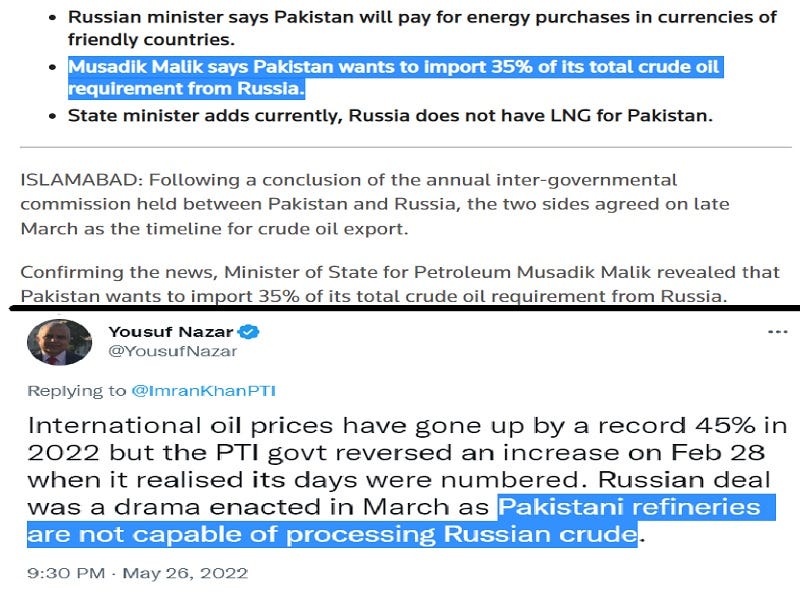The Pakistani Petroleum Minister Discredited Prior Fake News About Russian Oil
Pakistani Minister of State for Petroleum Musadik Malik’s official statement about Pakistan’s intent to import 35% of its total crude oil requirement from Russia, which was obviously approved by new Chief Of Army Staff Asim Munir, sharply contrasts with the prior fake news about Russian oil that circulated immediately after last April’s post-modern coup. Some Pakistani influencers at the time falsely claimed that “Pakistani refineries are not capable of processing Russian crude”, as one infamously put it, only to be totally discredited by this week’s development.
Pakistani Minister of State for Petroleum Musadik Malik told the media on Friday that his country wants to import 35% of its total crude oil requirement from Russia according to remarks that were reported on by Geo TV after the two sides signed three intergovernmental agreements following talks in Islamabad. “Russian-Pakistani Economic & Energy Cooperation Just Took A Great Leap Forward” as a result, which couldn’t have happened with the blessing of new Chief Of Army Staff (COAS) Asim Munir.
Unlike his predecessor COAS Qamar Javed Bajwa, who behaved like a pro-US wrecking ball since helping to carry out last April’s US-orchestrated post-modern coup against former Prime Minister Imran Khan as punishment for his independent foreign policy, COAS Munir has a much more balanced foreign policy. He rightly understands the importance of Russia in the context of Pakistan’s first-ever National Security Policy from January 2022, hence why he did his utmost to make this week’s energy talks a success.
The reason why the reader is being reminded of this is to contrast Minister Malik’s COAS-approved official statement about Pakistan’s intent to import 35% of its total crude oil requirement from Russia with the prior fake news about Russian oil that circulated immediately after last April’s coup. Some Pakistani influencers at the time falsely claimed that “Pakistani refineries are not capable of processing Russian crude”, as one infamously put it, only to be totally discredited by this week’s development.
What this shows is that former COAS Bajwa did indeed order an information warfare campaign against the Russian dimension of ousted Prime Minister Khan’s foreign policy, which took the form of the post-modern coup regime’s media proxies spewing the false statement mentioned above. The intent appears to have been two-fold: discredit the former premier’s Russian-centric energy diversification strategy and provoke Russia into responding with its own anti-Pakistani fake news campaign.
Both failed, however. The post-modern coup regime that he himself helped install ultimately returned to former Prime Minister Khan’s Russian-centric energy diversification policy out of desperation to relieve the pressure brought about by the financial crisis that COAS Bajwa catalyzed by last year’s coup. Moreover, Moscow refused to play the obvious tit-for-tat information warfare game that he was trying to bait it into and instead continued holding talks on apolitical energy cooperation.
Five significant conclusions can be gleaned from the aforementioned observations. First, former COAS Bajwa functioned as a pro-US wrecking ball from April until his departure from office last November. Second, to that end, he ordered his post-modern coup regime’s media proxies to spew fake news about Russian oil in order to discredit the Russian-centric energy diversification strategy of the premier who he helped oust and provoke Moscow into reacting with its own anti-Pakistani fake news campaign.
Third, both plots failed since the same post-modern coup regime that he himself helped install ultimately returned to pursuing former Prime Minister Khan’s Russian-centric energy diversification strategy after Moscow continued holding talks with them instead of biting COAS Bajwa’s bait. Fourth, the resultant great leap forward in Russian-Pakistani economic and energy cooperation was obviously blessed by new COAS Munir, and finally, this shows that Islamabad is recalibrating its pro-US policies.
To be clear, no break in Pakistani-American ties is expected, nor any serious turbulence either. Rather, what’s happening isn’t the result of COAS Munir having a multipolar outlook per se, but him simply doing what’s needed in an attempt to help Pakistan recover from the economic and financial crises catalyzed by the post-modern coup that his predecessor helped carry out. In order to fully succeed, he’ll have to organize truly free and fair elections as soon as possible, but that still remains to be seen.




